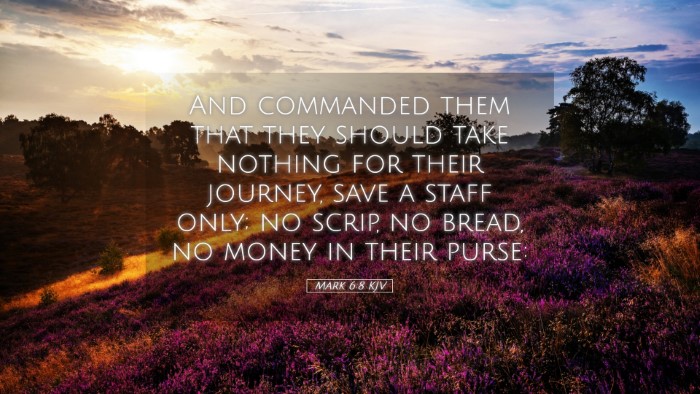Commentary on Mark 6:8
Mark 6:8 states: "And commanded them that they should take nothing for their journey, save a staff only; no scrip, no bread, no money in their purse." This verse reveals important aspects of Christ's instructions to His disciples as He sends them out to minister. The command encompasses a remarkable doctrine of dependency, reliance on God, and the sacrificial nature of discipleship.
1. Contextual Understanding
The immediate context of this verse is vital for understanding the depth of Jesus' instructions. He sends His disciples on a mission to preach the Gospel, casting out demons and healing the sick. The larger narrative illustrates Jesus' authority and the empowerment of His followers to continue His work. As Matthew Henry notes, this calling showcases the transition from passive followers to active participants in the ministry.
2. The Call to Simplicity
The specificity of Jesus’ command regarding what the disciples should take on their journey underscores a profound message about simplicity. The items they are permitted to carry—only a staff—serve not merely as physical provisions but symbolize reliance on God’s provision. Albert Barnes articulately points out that this simplicity was intended to prevent distractions and maintain focused reliance on divine power.
2.1. The Staff’s Symbolism
The staff, in biblical literature, carries various connotations, including guidance, support, and protection. Adam Clarke explains that it represents the strength and assistance God provides, encompassing both the literal and spiritual. By instructing His disciples to take a staff but leaving behind other items, Jesus emphasizes the need to trust fully in God’s sustaining grace during their ministry.
2.2. Avoidance of Materialism
Additionally, the mandate to avoid taking a "scrip," "bread," or "money" highlights Jesus' insistence on refraining from materialism. Henry’s commentary reveals that Jesus seeks to instill a sense of urgency and the need for faith. When the disciples set out without these provisions, it challenges them to put aside worldly concerns and place their trust in God’s adequate provision for their needs.
3. Theological Implications
This passage invites theological reflection upon the nature of discipleship. Disciples are called to be stewards of the Gospel, reliant not on earthly possessions but on the power of Christ. Clarke emphasizes the dual call to both responsibility in carrying the Gospel and the willing surrender of personal security.
3.1. Apostolic Authority
Jesus’ directive also serves to affirm the apostolic authority bestowed upon the disciples. By sending them out with the objective of preaching repentance (as noted earlier in Mark), He imbues them with a sense of divine commission that no earthly provisions can enhance. Barnes elucidates that through their lack of means, the power of God is more vividly displayed, showcasing how God provides for those who are faithful in their mission.
4. Lessons for Today's Believer
The exhortation found in Mark 6:8 resonates with contemporary believers. The call to depend on God rather than wealth is ever relevant in an increasingly materialistic culture. Here are some pertinent lessons:
- Faith Over Fear: Believers are encouraged to step out in faith, trusting God to provide for their needs even when circumstances seem dire.
- Purposeful Living: Following Jesus requires a commitment to living purposefully, prioritizing the Gospel over personal comforts.
- Community Support: The early disciples' reliance on one another and the Church reminds today’s believers of the importance of community in fulfilling God’s mission.
5. Concluding Reflections
Mark 6:8 provides profound insights into the nature of discipleship and God's provision. Through a command rooted in simplicity and reliance, Jesus equips His followers to advance His kingdom. The effective ministry stems from faith and divinely empowered action rather than worldly resources. As pastors, theologians, and students reflect on this short yet impactful verse, they are encouraged to embrace the lessons of dependence, simplicity, and obedience in their own journeys. Just as the disciples were sent forth with a foundational command, so too are believers today called to embrace their mission with a trusting heart.


